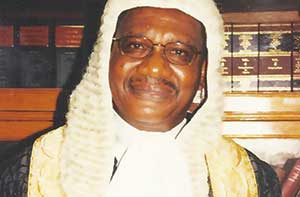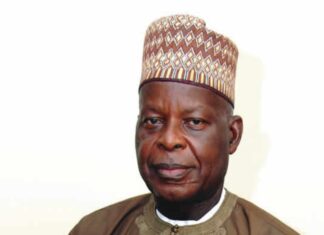Arguments are rife on the immunity clause in the constitution. While some Nigerians contend that it should continue to be in the country’s statutes books, others argued that it should be expunged, that it gives undue protection to the executive arm of government and encourages corruption and impunity. Senior Correspondent, ONYEWUCHI OJINNAKA, writes.
Since the drafting, adoption and implementation of the 1999 Constitution by the military, which was handed over by the General Abdulsalami Abubakar (rtd.) administration to the democratically-elected administration of then President Olusegun Obasanjo, a lot of fuss has been hovering over Section 308 of the constitution which contains immunity for the president and governor along with their deputies.
For the purpose of clarity, Section 308 of the constitution states that:
“Notwithstanding anything to the contrary in this Constitution, but subject to Subsection (2) of this section:
a) No civil or criminal proceedings shall be instituted or continued against a person to whom this section applies during his period of office;
b) A person to whom this section applies shall not be arrested or imprisoned during that period, either in pursuance of the process of any court or otherwise; and
c) No process of any court requiring or compelling the appearance of a person to whom this section applies, shall be applied for or issued;
Provided that in ascertaining whether any period of limitation has expired for the purposes of any proceedings against a person to whom this section applies, no account shall be taken of his period of office.
The provisions of subsection(1) of this section shall not apply to civil proceedings against a person to whom this section applies in his official capacity or to civil or criminal proceedings in which such a person is only a nominal party.
This section applies to a person holding the office of president or vice president, governor or deputy governor; and the reference in this section to “period of office” is a reference to the period during which the person holding such office is required to perform the functions of the office.”
The import of the section is that all elected officers mentioned in subsection (3) of that section are protected from arrest, prosecution, imprisonment, civil and criminal proceedings while they are still in office.
The argument on whether the clause should be expunged or retained from the constitution continues to rage on. While some public analysts posit that it is giving undue protection to such public office holders who may capitalise on the immunity they enjoy to perpetrate corruption, others were of the view that expunging it would eliminate distractions from the officers. For instance, they argued that if the section is expunged, political opponents or those who sponsored a governor to win an election but feel neglected by the said governor while in office may drag him to court in order to recover their money.
Besides, if such situation arises, the said governor, rather than use his personal funds, would use the state funds to defend himself while the case lasts, at the detriment of the citizens of the state.
However, as controversial as the issue is, TheNiche sought the views of prominent lawyers on whether immunity clause should be expunged or not.
A renowned Professor of Law, Constitutional lawyer, human rights activists and a Senior Advocate of Nigeria (SAN), Professor Itse Sagay, said that the provision of the clause in our constitution is in order, adding that immunity lasts during the time the person is in office, and after leaving office, he could be arrested and prosecuted if he was found to have abused his office during his tenure. He also reasoned that the office holder would be distracted if immunity clause is removed.
Sagay observed: “The problem in Nigeria is that we have been unable to successfully prosecute the public officers alleged to have committed criminal offence while in office.”
To buttress the observation made by Sagay, the prosecution of former governors like Chimaroke Nnamani of Enugu State, Rasheed Ladoja of Oyo State, Joshua Dariye of Plateau and even the incumbent governor of Ekiti State, Ayo Fayose, and other governors charged for one criminal offence or another by then Economic and Financial Crimes Commission (EFCC) are still pending in courts for about eight years and yet the conclusion of the cases is not in sight.
Nonetheless, an elder statesman, one-time presidential candidate of the defunct National Advance Party (NAP) and a delegate to the National Conference, Tunji Braithwaite, differed completely from the position of Sagay. He emphatically said, “I am against immunity to public office holders because it encourages corruption.”
Braithwaite stated that the 1999 Constitution gives blanket immunity to public officers, adding that it is the main cause of widespread corruption in the country. He disclosed that the issue was extensively debated at the national conference and after the debate, “We recommended that it should be removed; but right now, I do not know whether it will be implemented or not.”
A senior member of the Nigerian Bar Association (NBA), Guy Ikokwu, collaborated with Braithwaite. He canvassed that the immunity clause should go, expressing that, to some extent, it would initially be difficult, but after some years, people who get into office will know that they cannot go scot-free. He cited the situation in India and other countries which have amended the immunity clause to suit their development.
He said: “The present system of governance in Nigeria plus immunity is more or less a way of welcoming corruption. Tell me one governor that EFCC has not brought charges of corruption against, but also tell me which of these governors EFCC has successfully prosecuted. If you check the governors whose cases are still hanging, most of them are on bail. Some of them are even members of the Senate. I can name so many of them in the South East, South South, South West and North East. In every of the six zones, you have former governors who have been charged. Some of them have had their illegal assets taken away from them. But that is not the same as convicting them. Because when you convict them, you deprive them of holding political office for life.”
However, a Lagos-based human rights lawyer, Ebun Adegboruwa, and Lagos-based lawyer, Benson Ndakara, strongly share same view with Sagay. Adegboruwa argued that the clause should be retained because a sitting governor or president should not be made to appear in court to answer charges or appear as witness. He maintained that it is derogatory and degrading to summon a sitting governor or president to court. Rather, once the public officer leaves office, he or she should be charged accordingly if any criminal act or offence is established against him while in office, he added. Besides the immunity is meant to allow focus and avoid distractions in governance.
He however stressed that “there is no immunity to the office of the governor or president, but the immunity covers him personally and I therefore support the immunity”.
Expressing his position on the issue, Ndakara said immunity clause should remain in order to avoid distractions and for the sanctity of the office.
“If the clause is not there, some political opponents will capitalise on it to distract the governor,” he stressed. He added that if a governor commits an offence while in office, he should be charged to court after leaving office.
Diverse views and arguments have been raging on between politicians, lawyers and public opinion pundits on the retaining or expunging of Section 308 from the constitution.
However, a member of the recent national conference disclosed that a recommendation was made for the repealing of immunity clause. But it is expected that the issue will be finally settled by the in-coming National Assembly when the national conference resolutions are presented to them by the executive.














